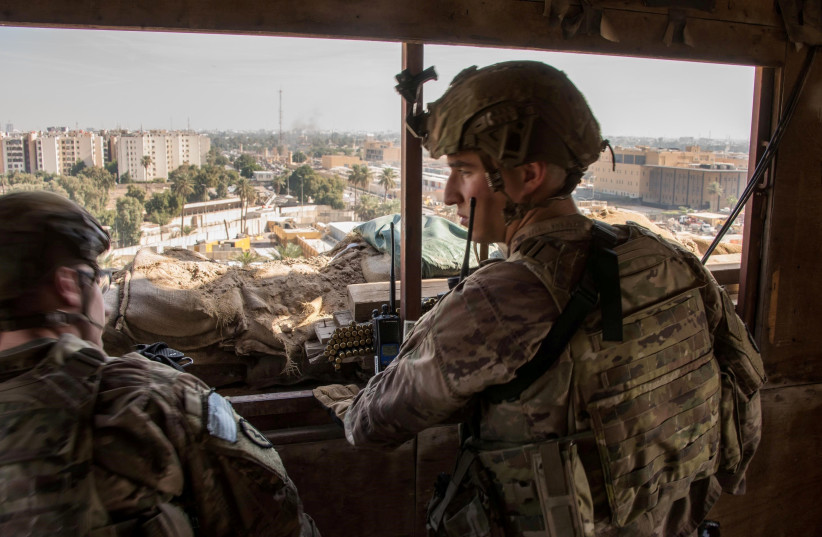US presence in the Middle East at a critical junction - opinion
The United States has provided a critical military presence in the region throughout the decades.

Ever since oil was first found in Persia (now Iran) in 1908, and later in Saudi Arabia (1938), the US has steadily increased its interest and presence in the region, even after the US has become energy independent. Now, despite its presidents' statements -- "US first" and "Asia first" -- the US finds itself deeply involved in Middle East (ME) affairs.
The US interests in the Middle East were never limited just to economic issues (securing the continuous flow of oil, ensuring safe shipping lines through the Red Sea and the Suez Canal, etc.) – they were also aimed at stopping other superpowers from taking over control of this important part of the world (the Germans in WWII, the Russians through the Cold War era and beyond, and now the Chinese).
To secure its position in this volatile area, the US has supported friendly regimes in many ways (financially, diplomatically, culturally, etc.), and especially through military aid (armaments, training, technology transfer), while maintaining a military presence both on the ground and on the high seas.
US military influence remains consistent in the Middle East
During the last five decades, US Armed Forces have engaged in a variety of military activities. These included the red alert of Oct. 1973 when the US and the USSR were standing at the brink of a nuclear confrontation, the Eagle Claw failed operation in Iran (1980), Lebanon (1982-83), the Gulf War (1991-92), Iraq (2003-07), Afghanistan (2001 – 2022), Somalia (2007-2020), and more.The dilemma has always been how far should the US go on the scale from small measured actions, typically retaliatory in nature and aimed at building or maintaining deterrence, all the way up to total war. This dilemma has recently become much more acute, as US forces are engaged in a gradually escalating series of conflicts with the Houthis in Yemen and Shiite militias in Iraq and Syria.
Some of these activities were directly aimed at US assets in the region – attacks on US military bases in Iraq, Jordan and Syria as well as attacks on commercial and Navy ships sailing near the Bab-El-Mandab straits – causing casualties and damages. Add to it the fact that Iran is now closer to nuclear capability than ever before, the constant tension caused by the Russia-Ukraine war, the growing US-China global rivalry and, not less important, the upcoming US elections, and you have the components of a “perfect storm.”
While President Biden, like his predecessors, has repeatedly stated that the US will not let Iran become a nuclear power, the Biden administration has not yet decided whether to change its attitude towards Iran or continue with its current faulty doctrine that seeks to reach a diplomatic agreement.
The US administration, with Israel's help, must ensure the continuous collection of information on the Iranian nuclear program, especially its progress on weaponization, and be prepared to strike at the program’s components and scientists inside the Islamic Republic. Washington must recognize the fact there is no purpose in continuing the nuclear negotiations and looking for a diplomatic solution with a regime that enthusiastically approves the slaughter of men, women, and children.
Fighting an octopus, rather than becoming tangled up in its tentacles, one must strike its head. The US is now engaged in fighting the Houthis in Yemen, and the Shiite militias in Iraq and Syria, but they are all tentacles, as is Hamas, Palestinian Islamic Jihad and Hezbollah. The head is in Tehran, and it is pursuing a weapon that could pose a true existential threat to the US, its allies, and the rest of the world.
While President Biden describes Iran’s development of nuclear weapons as unacceptable, his approach towards defusing the nuclear threat still rests on the hope that diplomacy and greater infusion of cash can persuade Tehran to back down on its pursuit of nuclear weapons. This is not the right way to achieve those goals.
Until recently, the White House has done its best to act as if Iran and Hamas pose separate challenges. Tom Friedman, posed last week Bidens three points plan for the ME, using the Oct. 7’s crisis as a leverage mechanism towards a huge change:
Unfortunately, this plan contains some unrealistic elements. The PA cannot really become "new", so it cannot be a part of any solution, a fact that may take the Saudis (who are a very important part of the puzzle) out of the plan.
The US can continue to engage with the tentacles of the octopus, perhaps achieving some tactical successes here and there, but leaving the major problems in the region unresolved. From a short-term perspective, especially in an election year, this is the more prudent approach as it will avoid major casualties and damages – both for the US and its allies and for Iran and its proxies. Alternatively, it can strike the head of the octopus in Teheran, risking an all-out war with all its implications, but creating an opportunity for major strategic gains in the long run, gaining back its deterrence.
Lt. Colonel (res.) Boaz Golany is a Professor at the Technion, Israel Institute of Technology where he has served as a Dean, VP for External Relations & Resource Development and Executive VP & Director General. His research interests cover diverse areas of applied Operations Research. He also serves as a Board member and consultant to some companies and organizations.







